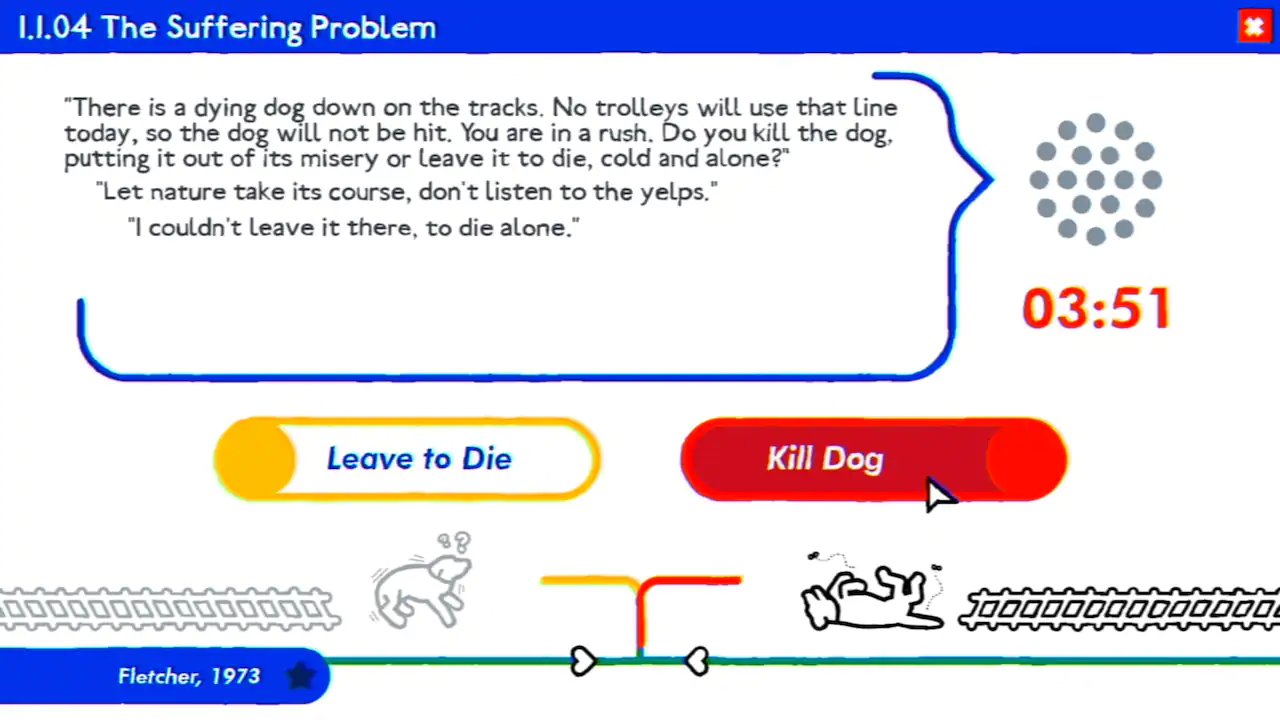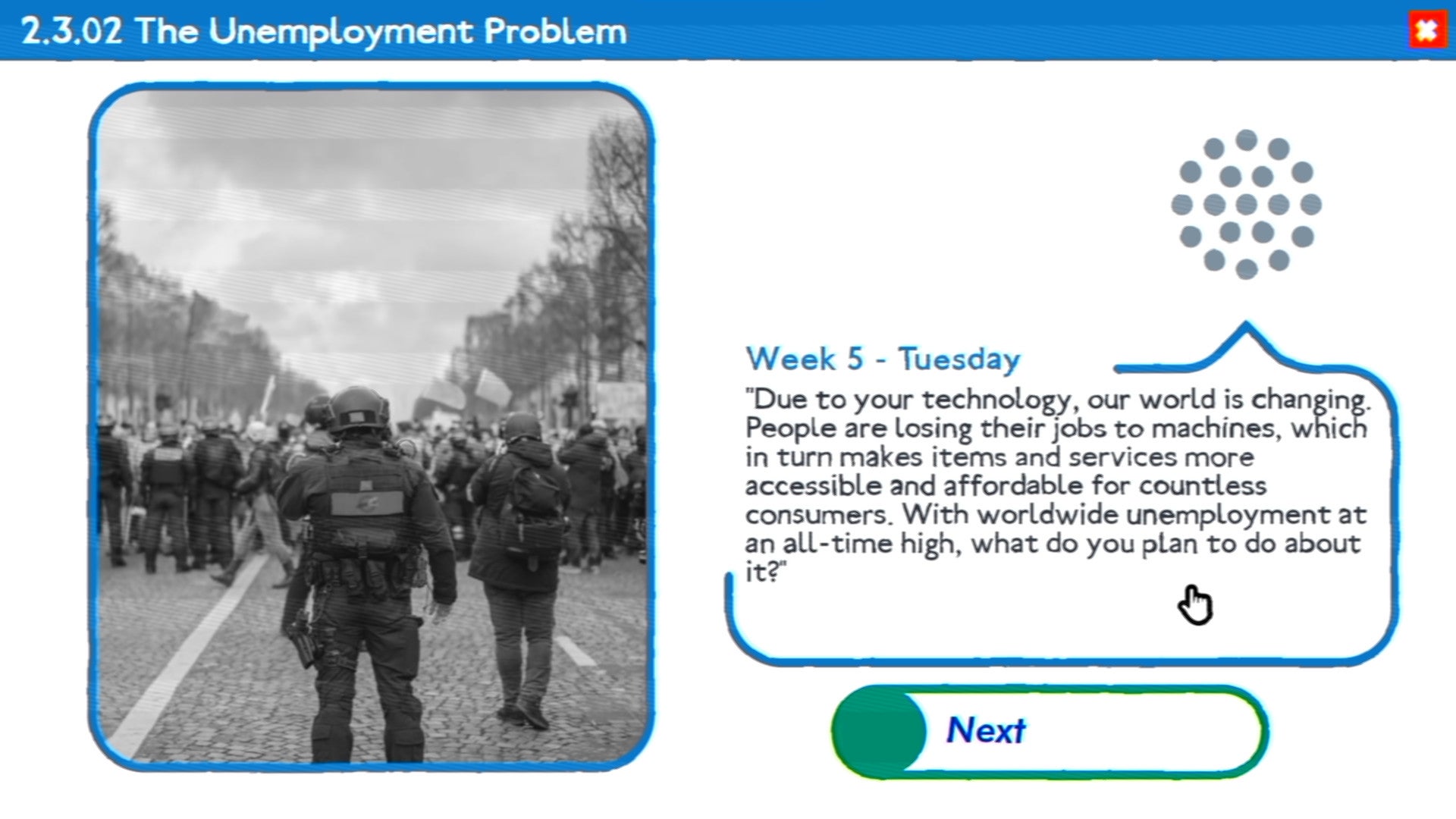You know what you’re thinking already, of course. But does your decision change with context? If the only way to save the five is to physically push a person onto the tracks to force the trolley to stop, is that worse than pressing a button? What about if the five are knowingly trespassing on the tracks, against warnings – does that make them less worth saving? As an ethical and philosophical study this quandary dates back to the sixties, but in recent years it’s a concept that’s been raised up from the land of professional philosophers to mainstream thought. It’s referenced often in TV, film, and books – and the study of ethics is the backbone of brilliant comedy series The Good Place. And now, we’ve got a video game based around this same concept. The appropriately-named Trolley Problem, Inc is my latest indie obsession on Steam, and the concept behind it is rather simple: it gives players difficult if not impossible-feeling decisions to make - and weaves a story via those choices. It actually starts out with you working at a rail company and making literal Trolley Problem decisions - but it quickly escalates - to health, to public safety, to planet-endangering decisions that stretch into the realm of science fiction - all loosely woven together into one narrative. This is a difficult game to talk about without getting into spoilers, which I absolutely, resolutely will not do. The narrative is the game here, and with varying surprises it had me squealing out with laughter, gasping in shock and shaking my head in mild disbelief in equal measure. What I can say is this: it’s brilliantly presented. A wry, knowing narrator guides you through the experience, which lasts a couple of hours but, of course, has branches suitable for experiencing multiple runs. All of the questions posed to you are built out of real-world philosophical studies, with the game even flagging up references in the bottom left corner that can be explored via a menu if you want to do additional reading outside the game. And, broadly, it’s all rather brilliant. It’s a simple concept. The presentation is clever, though it’s also not exactly anything you couldn’t have experienced in a Flash game years ago. The star of the game in every sense is the sort of British Public Service Announcement energy to its art and the knowing, often accusatory narrator. The narrator in particular really defines the experience. She has no time for your bullshit – whatever flavor it might be. As you make decisions, Trolley Problem, Inc coolly counts your achievements after each question. It also shows you how your decisions compare to the masses. As I racked up killed innocents, a dead dog (and a hell of a lot worse), I was gripped. There’s a ‘feel bad’ component to this too, of course. Through the entire experience there’s a slight sense of futility - the idea that, no matter what you do, you and the world might just be a little bit fucked. Are there really bad decisions, or only bad people? Are you a bad person? Or are you a victim of circumstances - of decisions hoisted upon you? And yet, in the same breath, as the game wears on, it has real things to say to you, the player. It speaks to you directly, with musings on life, and what is good about life, and what is worth holding on to tightly. It’s interesting, and quite unlike anything I’ve played before. I loved it, though I have to admit I don’t feel any particular desire to play it again. Over on Steam, the reviews for Trolley Problem, Inc are understandably, predictably mixed. Common complaints are that the ‘choice’ offered throughout its narrative are illusory, that it’s a short experience for the entry price of $10, and even grumbling that no matter what choice you make, the narrator criticizes you. But… that’s sort of the point, I feel. That needling doubt is a core part of what this game is trying to convey. Like I said, while often funny in its absurdity or cheekiness, there’s a definite ‘feel bad’ energy to elements of this experience. As for the price - I had about as much fun playing this as I did in my last trip to the cinema, which cost about the same price for about the same ‘length’ of content. Make of that what you will. For those familiar with The Good Place, mentioned earlier, this feels like exactly the sort of thing that would’ve been introduced in that game to torture Chidi. Which is pretty rad, when I think about it. Like a TV sitcom that regularly quotes Plato, though, it’s definitely an acquired taste. Thus the mixed reviews. As a musing on one of the most paralyzing and divisive philosophical questions there is, Trolley Problem, Inc isn’t exactly the most subtle of experiences. It doesn’t pretend to be philosophically pure and perfect, though, and it doesn’t pretend to have the answers. It just presses your buttons to get you thinking - and it sure does. It’s not an experience I’ll be forgetting in a hurry.

